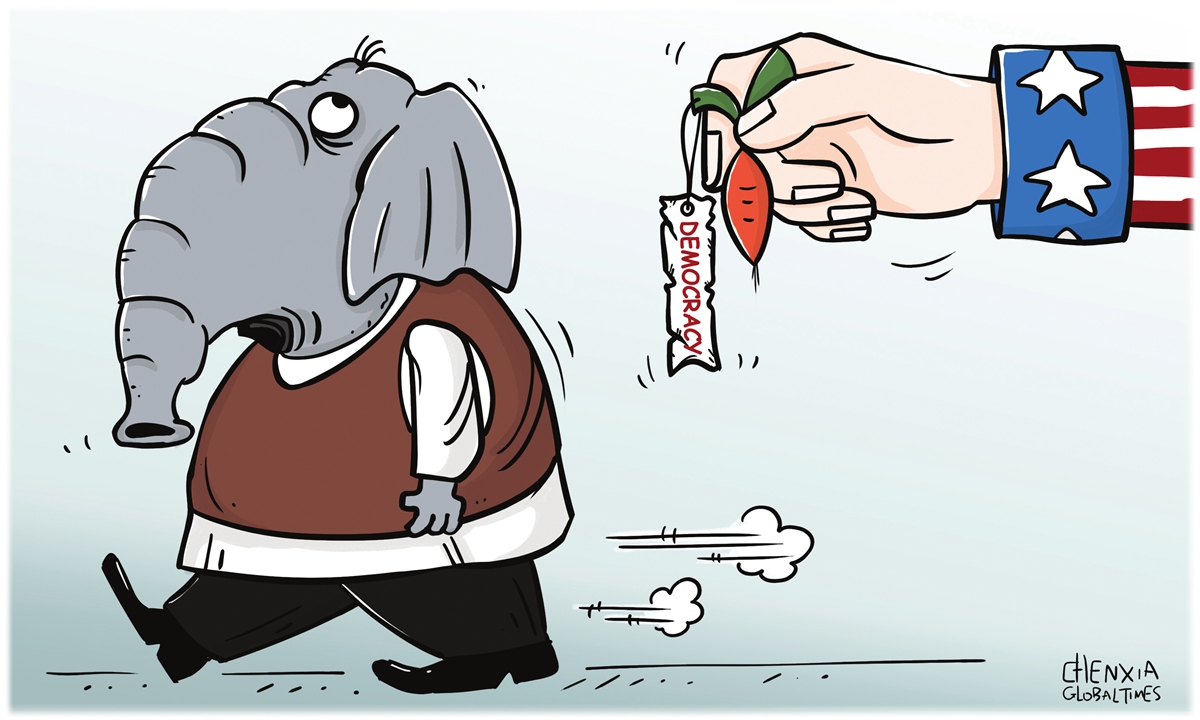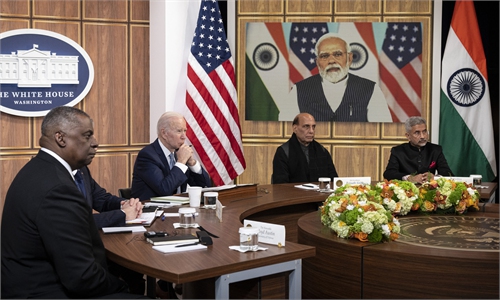
India Illustration: Chen Xia/GT
Since the beginning of the military conflict between Russia and Ukraine, India's neutral stance over this issue has irritated many Western countries. During his tour of Europe this week, Indian Prime Minister Narendra Modi is expected to explain India's position on Ukraine to EU leaders, according to German media Deutsche Welle.
On Tuesday, Denmark's Prime Minister, Mette Frederiksen, urged her visiting Indian counterpart to try to "influence Russia" to end the war. However, no change of tone on the ongoing Russia-Ukraine conflict has been heard from New Delhi.
A "democratic" nation recognized by the West should stand with them, but India is not doing so. Against this backdrop, Washington is trying to use its old trick to divide the world into blocs under its "democratic or authoritarian" narrative while keeping pressuring New Delhi.
India, the world's "largest democracy" as Washington has been trying to portray, has parted ways with the US and its core Western allies over the Ukraine crisis. It is, instead maintaining ties with one of Washington's "authoritarian" rivals to advance its own interests. This is a huge blow to the US's threadbare democracy card.
Even though Washington keeps claiming that Kiev is engaging in a battle to "defend democracy for their nation and for the world," such self-deceptive rhetoric can only fool Americans that have been deeply misled by American politicians. It's clear to all that the war in Ukraine is provoked by Washington to defend US' geopolitical and economic interests.
Experts told Global Times that India will not give up its long-established ties with Russia, whether in terms of energy or arms deals, to maintain the label of "democracy" lauded by the US.
Lü Xiang, a research fellow at the Chinese Academy of Social Sciences, believes that if India continues to choose not to stand with the US, its title of "democracy" might even be removed by Washington.
However, Zhang Tengjun, Deputy Director of the Department for Asia-Pacific Studies at the China Institute of International Studies, argues that such a scenario is unlikely to happen as the US and its main Western allies need India more than India needs them.
But in the end, it is not up to Washington to define whether a country is a democracy or not. As the US abuses the concept of democracy and arbitrarily labels other countries as "democratic or non-democratic," the US' authoritarian tendency will only be revealed, making the country even less attractive when it tries to rope in other nations.
Washington wants to avoid as much impact as possible on US-India relations due to their divergence over the Ukraine crisis. Zhang noted that the US has chosen interests over its so-called values, which proves that the country is not driven by values at all.
A Chinese scholar, who asked to remain anonymous, said that generally speaking, the concept of democracy is closely related to a country's domestic affairs, not to the foreign ones. Therefore, almost no country besides the US will treat democracy as the greatest code of conduct in its foreign policy. Let alone, democracy in Washington's rhetoric is far from what democracy is supposed to be.
Washington is trying to monopolize the definition of democracy and how to identify if a country is a democracy. It shows how "utilitarian" it is in terms of advocating its interpretation of democracy, rather than truly caring about the democratic ideal as it claims to be. As a result, the US has completely defiled the concept of democracy.
After the Russia-Ukraine conflict broke out, it seems that the US and some of its allies in the West are forcing all countries in the world to take a pro-Russia or anti-Russia side. Western countries, especially the US, are trying to coerce or lure more countries into their anti-Russian bloc that is largely guided by values and ideology.
In Lü's opinion, it is quite na?ve for Washington to think it can use its so-called democracy to hijack other countries into an alliance and divide the world by institutions and ideologies in a Cold War-like manner.
Washington has been attacking and smearing rivals in its eyes under the guise of democracy. Currently, it is increasingly considering Beijing as its number one competitor. Thus, in many cases, if a country can help the US to gain advantages in its strategic competition with China, then it is valuable to Washington, even when they don't share the same values completely.
The US did not harshly criticize India for supporting "autocracy" over its position on the Russia-Ukraine conflict. "It is obvious that the US still hopes to woo India to achieve its so-called Indo-Pacific Strategy. It also shows that the conflict between Beijing and Washington is the principal contradiction for the US.
The author is a reporter with Global Times. opinion@globaltimes.com.cn

